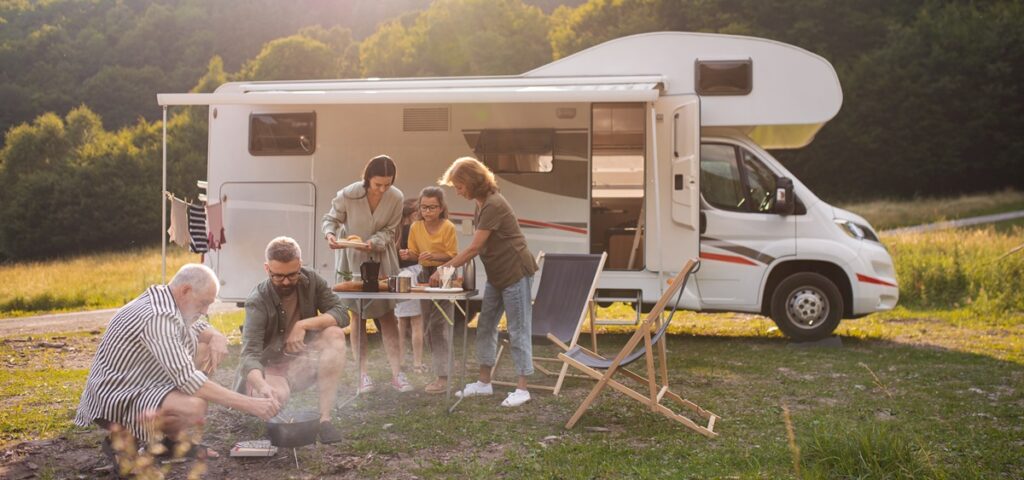Drinking or using drugs in a parked vehicle might seem safe and harmless, but it’s not that simple. In Quebec, drinking or using drugs is not allowed in a road vehicle, whether the vehicle is on a public road, a private road or even in a shopping mall parking lot. But what about in vehicles made for sleeping and living in, like a recreational vehicle (RV)? Do the same rules apply?

Drinking or using drugs in your vehicle can be a crime, even if it’s a vehicle designed for sleeping and living in, like a recreational vehicle (RV). According to Sergeant Bilodeau from the Sureté du Québec (SQ) communications department, “Camper vans and other similar recreational vehicles are road vehicles under the Highway Safety Code.” The Criminal Code also applies to your RV when it’s in your care or control, according to the SQ.
It’s a crime even if your vehicle isn’t moving
Sleeping in your vehicle when you’re impaired can be a crime. That’s because you may still be considered to have care or control of your vehicle. You’re considered to have care or control of your vehicle if you could intentionally or accidentally put it in motion, even if you’re not actively driving it.
According to the Supreme Court of Canada, three elements must be evaluated to determine if you have care or control of your vehicle:
- If you intend to drive,
- If your capacity to drive is impaired,
- If there is a realistic risk of you putting your vehicle in motion.
In other words, you can be charged with having care or control of your vehicle while impaired even if you had no immediate intention to drive. If there’s a risk that you could put the vehicle in motion, that’s enough. For example, an impaired person sleeping in their vehicle might change their mind and decide to drive after resting. Also, someone who’s drunk and sitting behind the wheel could unintentionally put the vehicle in motion.
Serious consequences immediately upon arrest
If you’re arrested while impaired and in care or control of a vehicle, serious consequences can apply immediately. For example, your licence will be suspended for a period of up to 90 days as soon as you’re arrested, even if no judgment is rendered yet. Your vehicle could also be seized.
If a judge finds you guilty of the crime, you could be sentenced to up to 10 years in prison. The minimum sentence is a $1,000 fine. Your driver’s licence could also be suspended for a period of 1 to 3 years.
A clear and detailed plan can help
Determining if you have care or control of a vehicle is a question of circumstances. It’s not a simple yes or no question. But having a clear and detailed plan can help demonstrate that you had no intention of putting the vehicle in motion and that your behaviour didn’t put anyone or any property at risk. This applies to all types of motor vehicles, especially those designed to sleep and live in, like RVs.
A truck driver accused of having care or control of a vehicle while impaired was acquitted after showing that he had a clear and detailed plan in place for his stop. The truck driver was arrested in Ville-Dégelis, in the Lower Saint Lawrence region. He had decided to rest in the sleeper berth of his parked trailer truck after an evening of drinking at the bar nearby. He had left the engine running to keep warm.
Before going out to drink at the local bar, he had filled out his daily log, indicating that he was making a 36-hour stop. The truck driver’s plan was to stay in Ville-Dégelis for the 36 hours, and to sleep in his trailer truck equipped with bunk beds, a fridge and a microwave. If necessary, he would use the bathroom in the restaurant, bar or hotel nearby.
The court found that the driver’s plan was credible. He had come up with his plan while sober and the court concluded that there was no realistic risk that he would put the trailer truck in motion. To make its decision, the court considered the following factors:
- The driver had written down his plan in advance in his daily log while sober.
- The vehicle was stationary with the emergency brakes engaged and the gear locked.
- The driver was resting in the sleeper berth and not in the driver’s seat.
- The driver had a clearly defined objective of taking mandatory rest, with no intention to keep driving.
As this example shows, if you’ve being drinking or using drugs and want to sleep in an RV, there are certain measures you can take to show that there’s no risk of putting the vehicle in motion. But remember that each situation is unique, and the police have discretionary power to evaluate these situations. Even with a clear and detailed plan, you could still be arrested and charged with a crime.
The law also applies to campgrounds!
As previously mentioned, the law prohibits drinking or using drugs when you’re in your vehicle on a public or private road or in a shopping mall parking lot. According to the SQ, this prohibition also extends to locations like campgrounds, rest stops and church parking lots. The SQ stresses that you must not be in one of these locations if you’re drinking or using drugs, otherwise you could be ticketed or even accused of a crime.





